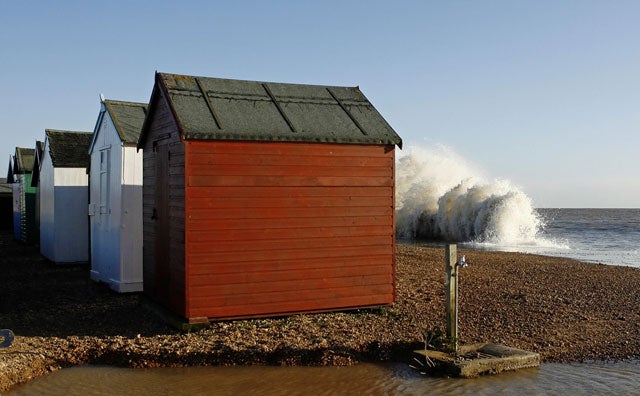Stark warning on Britain's shrinking coast
Abandon homes to the rising sea, warns Britain’s new environment chief

Stretches of Britain's coastline are doomed and plans will soon have to be drawn up to evacuate people from the most threatened areas, the new head of the Environment Agency warns today.
In his first interview since taking office, Lord Smith of Finsbury says Britain faces hard choices over which areas of our coast to defend and which to allow the sea to reclaim. He said detailed work was already far advanced on identifying areas of the east and south coasts which were most vulnerable to erosion, and called on ministers to give emergency help to families whose homes will be lost.
In a wide-ranging interview, Lord Smith, a former cabinet minister, also warns that the Government is not taking the environment seriously in a series of key projects. He says:
*Building a third runaway at Heathrow Airport would be a "mistake" because of pollution and aircraft noise;
*Plans for a new generation of coal-fired electric power stations should be abandoned until the Government is certain they will not pump out harmful gases;
*The proposed Severn barrage will destroy fish stocks and wreck bird habitats.
Lord Smith disclosed that the agency was drawing up projections of where sea erosion will do most damage over the next five, 25, 50 and 100 years. It is also factoring in the additional problem of the threat to low-lying areas from rising sea levels. "This is the most difficult issue we are going to face as an agency," he said. "We know the sea is eating away at the coast in quite a number of places, primarily – but not totally exclusively – on the east and south coasts. It's a particularly huge issue in East Anglia, but in quite a number of other areas as well."
Lord Smith, a former culture secretary, promised to do his "level best to try to defend communities where there are significant numbers of properties under threat and where it's possible to find engineering solutions".
But he said the agency, working with ministers, would have to identify "priority areas" and warned: "We are almost certainly not going to be able to defend absolutely every bit of coast – it would simply be an impossible task both in financial terms and engineering terms." Suggesting that parts of north-east Norfolk and Suffolk faced the most immediate danger, Lord Smith promised to work closely with the communities involved to achieve as much "consensus" as possible over which coastal stretches to protect.
He said: "We will publish next year details of the work that's been done, where we think the particular threats are, where we think there is current defence in place. We will begin to talk with communities where we think defence is not a viable option."
He also said ministers could no longer rely on insurance companies to cover families who lost their homes, suggesting they would have to be rehoused at taxpayers' expense. He said: "We need to start having a serious discussion with government about what options can be put in place."
Lord Smith put himself on a collision course with his former colleagues over a number of important infrastructure projects championed in Whitehall. He dismissed the Department of Transport's insistence that building a new runway at Heathrow could be environmentally sustainable.
"The increases in volume of air traffic and the consequent increases in congestion on the ground are, from the analysis that we've done, pretty unavoidable," he said. "I think the Government is making a mistake and I will carry on telling them that I think they are making a mistake."
He opposed building a new coal-fired power station at Kingsnorth in north Kent – with others to follow – because he is not satisfied the promised technology to "capture and store" carbon would have been developed in time for its planned opening in the next decade. "My view would be that we should not go ahead with the development of a new coal-fired generation unless those [clean coal] technologies are in place and we can clean up the emissions."
Although he supported using the river Severn's huge tidal power to generate electricity, he said he was alarmed at the Government's support for a fixed barrier. "Effectively you would be destroying the fish populations of everything up the river system from the barrier. That is a major environmental downside."
Join our commenting forum
Join thought-provoking conversations, follow other Independent readers and see their replies
Comments
Bookmark popover
Removed from bookmarks